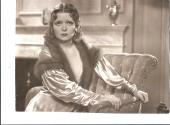'Only Lovers Left Alive': an incisively original take on vampires from Jim Jarmusch
Pity a depressed vampire: His existential despair is maximized by the fact that his existence is eternal. Pity -- even more -- a suicidal vampire: He can't very well drive a stake through his own heart. But he can order a custom-made .38-caliber wooden bullet.
There's trouble in the paradise of Adam (Tom Hiddleston) and his Eve (Tilda Swinton), who are pretty much the "Only Lovers Left Alive" in the down-and-out 21st century of director Jim Jarmusch. Madly in love for millennia, they live apart but reunite every few hundred years for sex, drugs and rock 'n' roll. Plus good conversation.
The sex is good, we gather, judging by the opening circular shots that find them dreamily thinking of each other in their separate rotating beds. The drug of choice is blood, of course. The rock 'n' roll is retro-1970s-80s, befitting Adam's eons-old status as a celebrated composer-performer.
In the first of many precoital and postcoital philosophical discussions, Adam longs for the good ol' centuries and laments the recent ones in which "they" -- mortal humans -- have slaughtered the great scientists and contaminated the water (not to mention the blood) supply.
Wondrously albino-strange Eve does her best to cheer him out of his doldrums (a good sexy slow dance usually works), but their idyll is rudely interrupted by the arrival of Ava (Mia Wasikowska), her out-of-control younger sister. He's had bad Ava experiences before and wants her out now, but overindulgent Eve cajoles him into letting her stay. The two girls are, after all, related -- "by blood," she points out.
Indeed, nothing matters more to this trio than the hemoglobin happy hour -- orgasmic bloody Marys sipped from the proper liqueur glass that leaves behind a nice V-8 type residue. The stuff is tough to get. You can't just suck any stranger's neck like you used to. The modern vampire's big occupational hazard is -- what else? -- blood poisoning. Adam scores periodic pickups with plasma pusher Dr. Watson (Jeffrey Wright), but he's seriously overdrawn at the blood bank.
Akron, Ohio-born auteur Jarmusch is the master of quirky, meditative states of mind, and of wonderfully stylish imagery to illustrate same. Nobody does postapocalyptic ambiance better, and no city is more postapocalyptic-looking than Detroit -- Adam's home these days -- eerily devoid of people and even cars, especially in nighttime.
Terrific music -- from LPs and 45s played on vintage record players -- graces the film, including Adam's own smooth, potent Hendrix-esque originals. He was probably Paganini in the past. He's now a collector-aficionado of classic Gibsons and Fenders. A sitar-guitar-percussion continuo emanates from old reel-to-reel recording equipment, interfacing with Apple smartphones and "Skyping" on an ancient Sylvania TV set!
Ms. Swinton's lovely performance is as good as her Oscar-winning one in "Michael Clayton" (2008). Those strange, spooky, luminous eyes devour not just Adam but everyone and everything else she sees. At 53, she has the body and figure of a 20-something -- so languorous and kittenish. Less lovely is grumpy, one-dimensional Mr. Hiddleston (of "Thor" fame), but I was much taken by John Hurt's world-weary Kit Marlowe, Eve's very dear (and very old) friend. I was most taken by adorably gorgeous Ms. Wasikowska as bad-girl Ava.
Mr. Jarmusch's "transcendent minimalism" comes with fluid editing, beautiful lighting and a tremendous production design in this mood-piece reverie, which celebrates the ageless-endless marriage of a fragile and endangered species. It's a wry exercise in genre-bending, retaining only a few (the most stylish) vampire conventions.
Above all, it's often wickedly funny. When a fellow plane passenger across the aisle cuts his finger on a soft-drink can, Eve can't help salivating. And in the middle of a chess game with Adam, she jumps up and runs to the fridge freezer for a treat: beautiful ruby-red bloodsicles!
The books she carefully chooses and packs for her trip to
The story is full of potholes and plot holes. The slow pace, lack of "action" and odd final segment in Tangiers will turn off many mainstream viewers -- as did similar issues in Mr. Jarmusch's "Stranger Than Paradise" (1984), "Down by Law" (1986) and the hypnotic "Dead Man" (1995, with Johnny Depp). The director attributes his take-your-time rhythms to Kurosawa's influence. In some ways, he's a kind of Philip Glass, or maybe John Adams, of cinema.
But you'll have more black-comic intellectual fun with his vamp "Lovers" than the "Twilight" ones. For this particular Adam and Eve, it's less about the infernal eternal than the here and now: Give us this day our daily blood.





